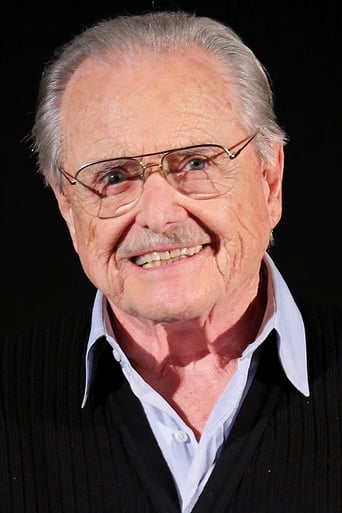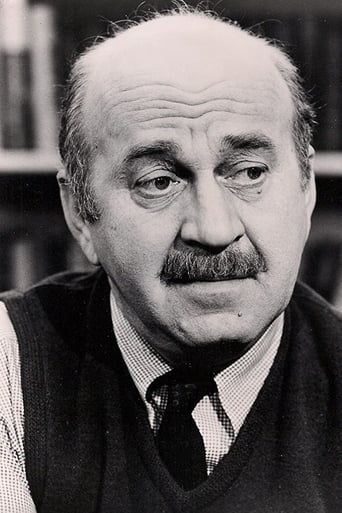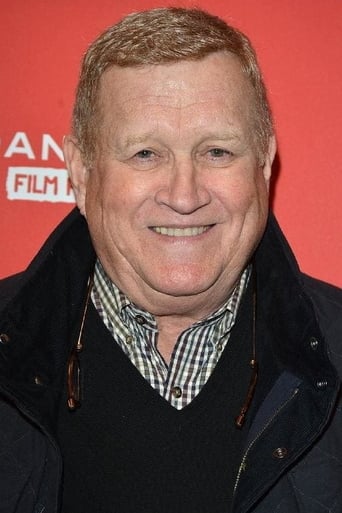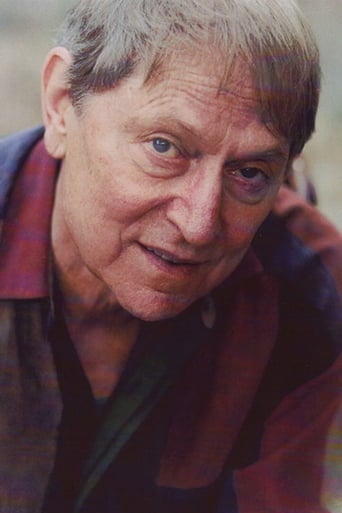FuzzyTagz
If the ambition is to provide two hours of instantly forgettable, popcorn-munching escapism, it succeeds.
Luecarou
What begins as a feel-good-human-interest story turns into a mystery, then a tragedy, and ultimately an outrage.
Calum Hutton
It's a good bad... and worth a popcorn matinée. While it's easy to lament what could have been...
Juana
what a terribly boring film. I'm sorry but this is absolutely not deserving of best picture and will be forgotten quickly. Entertaining and engaging cinema? No. Nothing performances with flat faces and mistaking silence for subtlety.
sommese
We regularly watch this film each 4th of July Holiday. While rest of town and neighborhood is off watching a fireworks display, we are having a small dinner party and watching and commenting on the film. Maybe not every year but certainly it is a regular annual event. Everyone has a favorite era of history. Having grown up in the Northeast USA, one cannot help experiencing the overwhelming War of Independence history of the area. It is in the air, the soil and ambiance of life in Northeast USA. California has it's Spanish Missions history which predominates life style. Northeast has SPIRIT OF '76.
mark.waltz
O.K., that is if you are descendants of the original 13 colonies and not descended from a a slave and not a woman who during this time and was still treated like a second class citizen. So America's first several centuries certainly had its faults, the most obvious of which was its European explorers who claimed to have discovered it yet basically banished or enslaved the natives who were already here and had already discovered it. But as the American colonies grew, so did the desire for those under British rule to form a new nation, and the congress congregated in Philadelphia were even divided about that. These long-ago patriots included famous inventors and future presidents, several state governors and notorious rebels. Here, the focus is on three of these men with others given moments in the spotlight to share their history. Future presidents John Adams and Thomas Jefferson, who have had their own more truthful tales revealed through T.V. and movies, and Benjamin Franklin, inventor extraordinary who has had more controversy revealed yet remains one of our greatest non-presidential figures ever in the American history books.The Broadway musical shocked everybody with its success, most theater people convinced that a musical about a basic High School History lesson would bomb quicker than the Americans over Hiroshima. But the way in which the story was told, passionately, elegantly and quaintly, surprised even the most cynical of critics, and the show ran for years, producing this motion picture as a result and later a successful revival that managed to extend past its intended limited run. The secret to the success of the show is the passion put into each of these characters, not simply American folk heroes whom we've only seen paintings of, but flesh and blood men and a few women who had dreams, passions and ideals, even if some of them have been a bit soiled over the years.William Daniels heads the pack as John Adams, the future "second president" (and first V.P.) who realized he was too obnoxious and disliked to write the Declaration of Independence. Adams may not be the most popular man in the congress (which he considers three or more useless men to be considered), but as you see his intentions and his desperation (told with sweet vignettes concerning his wife, seen in dream sequences describing their letters to each other), you can't help but like him. Benjamin Franklin, as played by Howard da Silva, is a lovable rascal, a bit perverted (although history has insinuated it to be more so), and every inch the "bigger than life" man his legacy has made him out to be. Future "White Shadow" Ken Howard is the soft spoken Thomas Jefferson, and while his controversial life as father to one of his slaves' children has since been revealed, here, it is his silent love for writing and his beautiful wife (Blythe Danner in one of her earliest roles) that makes him get down to write the most famous document in American history. Virginia Vestoff is tender as the feisty but loyal Abigal, and her singing several romantic duets with Daniels is one of the film's many highlights.For Daniels, Da Silva and Danner, there is the show-stopping "He Plays the Violin" where Danner confides the quiet Jefferson's secret of lovemaking to them. It leads into a lively dance sequence that proves you don't need tons of chorus people to make you tap your feet. Daniels and Da Silva are joined by Howard for "The Egg" in which they seemingly fictionally imagine what bird will be made the symbol of their hopeful new nation. In spite of its obvious falsity, the sequence is a symbol of hope that probably every patriot of a new nation felt as they stepped forward to change the course of history.The other congress people are a magnificent bunch of Broadway and Film actors, especially Ron Holgate as Richard Henry Lee, repeating his Tony Winning role with the show-stopping "Lee's of Old Virginia", theater legend John Cullum as Edward Ruthledge who is determined to keep slavery alive in spite of objections of the northerners in congress, Roy Poole as the drunken Stephen Hopkins, William Hansen totally moving as the seemingly dying Cesar Rodney, original "Annie Get Your Gun" co-star Ray Middleton as the very Scottish Thomas McKean, David Ford as Congressional President John Hancock (the first man to sign the declaration, hence the slang term "give me your J.H.") and John Myhers as the portly Robert Livingston. Along with Rex Robbins, Daniels, Da Silva, Howard and Mhyers sing the rousingly unforgettable "But Mr. Adams" in which the declaration committee argues over who will actually write it. Also memorable is William Duell as the feisty Andrew McNair, the congressional custodian who gets his own moment when he sings a bit of the moving "Mama, Look Sharp", an obviously anti-war song about what was going on at the time in Vietnam with young innocent men being killed or maimed. Future "Benson" governor James Noble is obviously recognizable as one of the New Jersey delegates. Fans of the 1984 Academy Award Winning Best Film "Amadeus" will recognize a few of the smaller roles here from that later masterpiece which ironically took place at the same time yet many thousands of miles away. You can't call all of this "the truth" although many of the lines have been proved to have been actually spoken by the men who say them on screen here. Beautifully photographed and scored with an opening credit scene that reminded me of paintings of Charles Dickens novels, "1776" is a must see, not only for theater fans and history students, but practically everybody else who loves what America stands for.
Gideon24
1776 is the 1972 film version of the groundbreaking Broadway musical that chronicles the people and events that led to the writing and signing of the Declaration of Independence. The musical centers on soon to be second President, John Adams, who according to this musical was a tireless but obnoxious advocate for the thirteen colonies independence from Great Britain and it was his zeal for this cause that led him to being central to the creation of the Declaration of Independence. William Daniels brilliantly recreates his Tony-winning Broadway role as John Adams, the restless and ever-vocal spokesperson for Independence who would not be silenced. He receives solid support from Howard da Silva, who does a scene stealing turn as Benjamin Franklin, Ken Howard as Thomas Jefferson, John Cullum as Edmund Rutledge, and the lovely Blythe Danner as Martha Jefferson. Virginia Vestoff also recreates her Broadway role as Abigail Adams, John's wife who is presented as communicating with John through letters brought to life. The heart- pumping musical score features highlights such as "Sit Down, John", "He Plays the Violin", "Yours, Yours, Yours", "But Mr. Adams", "The Egg", "The Lees of Old Virginia", and the haunting "Molasses to Rum" (brilliantly performed by Cullum). One number, "Cool Considerate Men" was cut during the film's original release but has been restored to some prints. If you're a musical comedy fan with an open mind willing to experience something a little different, give this treasure a try.
TheUnknown837-1
At the end of "1776," I was restless, extremely bored, and stunned into disbelief. What shocked me was not the way some of the most important men and events in American history were presented in this film, but what had happened the joyfully self-parodying part-comedy that I had been enjoying so boundlessly just an hour and a half before. At the beginning "1776," I was giggling, slapping my knee, and even humming along to some admittedly campy but delightful songs. It did not bother me that John Adams, Benjamin Franklin, Thomas Jefferson, among others were being represented as clowning windbags. I was having a good time. And I kept on laughing for about an hour and twenty minutes. Then the film changed gears, the songs lost all their punch, and Director Peter H. Hunt completely abandoned his sense of pacing."1776" is based on the phenomenally successful stage musical that ran on Broadway for three years. It was directed by the same man and features most of the same cast. Two of the actors--Ralston Hill and Charles Rule--made their only film appearances in this movie. Being a musical, the stage production--and film--was part-comedy, so the dialogue pokes fun at the Founding Fathers of the United States. John Adams, as played by William Daniels, is an unctuous and arrogant little man with a dream of independence. Howard Da Silva plays Ben Franklin as a big-hearted, enigmatic old man. Thomas Jefferson is presented by Ken Koward as a dreamy-eyed writer who would rather rush home to his wife in Virginia than stay and write the Declaration of Independence. There's even Roy Poole, played exuberantly by Stephen Hopkins, who needs to have the rum hidden from him during all congressional meetings. These caricature performances unquestionably will, and have, angered some. But that did not irk me. I didn't even have any qualms with the movie's implication that Thomas Jefferson overcame writer's block by kicking John Adams and Ben Franklin out of his house while he had sex with his wife. There's a classic moment where he gives Adams a letter saying that he'll write the Declaration after he "takes his wife back to bed, so please go away." All Adams can say with a dry voice is: "Incredible!" Franklin, meantime, chuckles under his breath.In fact, the caricatures were part of what made me enjoy the first half of the movie so much. These actors are clearly have the time of their lives poking fun at American figures. In particular, Mr. Daniels is very entertaining as John Adams. The way he struts around like a proud peacock, his cane always thrusting at his side, and never changes his expression once be he angry, excited, or even remorseful. It is a shame that this very-good actor is basically unknown in the world of film outside of this film and "The Graduate." The banter that Mr. Daniels and Mr. Da Silva have is giddily funny, as the latter's laid-back personality counteracts the former's sternness...even if it is hard to believe that a man this lazy and care-free could have had the patience to invent the lightning conductor.I was also getting a kick out of the cheesy songs. There is one sung by Ron Holgate (as Richard Henry Lee) in which he quips his surname to adjectives, such as "certain-Lee!" and "absolute-Lee!" Sure, it's goofy, but it's consciously goofy. The opening number, "Sit Down, John!" is also good. And although I could not quote the lyrics, the resurfacing number that plays when John Adams and his wife (Virginia Westoff) has a very soothing and uplifting musical score in the background which I found intoxicating to listen to over and over again. In fact, I found myself pretending there was no singing, just the music.So there's some joyous acting, giddy songs, and big laughs. The only problem is that that only lasts for the first part of the picture. After that point, when Congress goes into a heated, several-reel debate about independence, does the movie lose its head. There are some great moments, such as when Adams, Jefferson, and Franklin stand up against those who wish to remove the clause absolving slavery. A bold move on the filmmakers' part is not placing an African American anywhere in sight, but talking about them and the issue. However, the rest of the sequence is just dry with what looks like static rehearsal shots filmed from too far away where some close-ups would heighten a sense of claustrophobia.Furthermore, and for the worse, the songs go sour and double their numbers. Characters with little purpose take unneeded possession of center stage. The key example is an unbearably dull song featuring the secretary McNair (William Duell) and a recurring Army scout. The drab lyrics, coupled with over-emphasized candle lighting, drag the scene out without mercy. Equally boring is a midway number where opposition to the Declaration step out into the streets and enunciates instantly forgettable lines. The subject matter? I can't remember, and I'm not ashamed to admit it. That is the mark of a bad song, when you cannot even recall the subject. Whereas I can instantly tell you that "Rum and Molasses" was about the slavery issue and "The Egg" was about getting Congress to approve the Declaration.The second half of the movie, shot in excessive wide-angles, peters out and destroys all of the momentum, energy, and zest that infused the first part. Even the final scene, composed of nothing but the Congressmen writing their names, goes on forever. "1776" is one of those films that I really wish I could say I liked, because I did for quite a while. And it stunned me that the second half could be so bad when the first half was so good.








